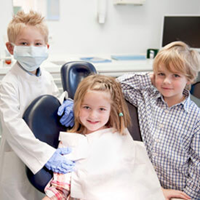what is a dental malocclusion?
Malocclusions of the mouth are defined as a mismatched bite or misaligned jaw that can result from a poor alignment between your top and bottom teeth. Malocclusion commonly causes a combination of overcrowding, crooked or turned teeth, and/or bite problems (underbite, overbite, crossbite). Dental malocclusion is broken down into three separate degrees. The first (Class I) is the most prevalent and appears when the top teeth overlap the bottom teeth properly but the teeth are turned or rotated and biting pressure is not evenly distributed throughout the mouth. The second (Class II) is when the upper teeth and jaw excessively overlap the bottom teeth and jaw. In Class II malocclusions, often times the bottom front teeth are completely covered by the top front teeth when a person bites down. Class III occurs when the bottom jaw sticks out, causing the lower teeth to cover the upper teeth and jaw. There are a wide variety of causes for malocclusion. It can be hereditary, or malocclusion may also be caused by trauma, thumbsucking, poor retention of previous orthodontic treatment, and tooth grinding. If left untreated, dental malocclusion can cause gum recession, tooth sensitivity, and TMD/TMJ disorder. Dr. Luke Riley of Riley Dental is highly skilled in the identification and diagnosis of malocclusions and offers years of experience designing treatment plans for Haslet, TX area individuals with bite conditions.
Reviews
what are symptoms of a Dental Malocclusion?
Depending on the form and seriousness of your malocclusion, Dr. Riley may refer you to a specialist. In the many cases, therapy will necessitate orthodontics to tackle your specific malocclusion. Sometimes treating a malocclusion is as simple as polishing the teeth to redistribute biting forces to the correct location. Other times a dental appliance commonly referred to as a night guard/splint can help alleviate the symptoms. Those that will benefit from therapies made for malocclusions are kids, teens, or adults that have malocclusions caused by poor teeth alignment.
Common symptoms of malocclusion include:
- Patients who are wearing their teeth prematurely or who frequently crack teeth and require crowns.
- Patients who experience frequent popping or clicking of their jaw when they open.
- Patients who wake up with sore teeth, a sore jaw, or headaches.
- Patients who have overly sensitive teeth when drinking cold water.
- Patients who have severe gum recession.
how do you treat a dental malocclusion?
The recommended treatment for most malocclusions is usually in the form of orthodontics. Dr. Riley exclusively uses a combination of Invisalign aligners and Propel Accelerator therapy for malocclusion treatment due to its superior movement accuracy and comfort. Occasionally, Invisalign and Propel therapy is inadequate and a patient requires an occlusal equilibration. In these cases Dr. Riley takes models of your upper and lower jaw, places them in a mechanical jaw called an articulator and analyzes your bite. After careful analysis, you come back for a series of short appointments where Dr. Riley selectively and non-invasively reshapes your teeth using an ultra fine tooth polisher so that your teeth can function properly.
can a malocclusion be cured?
In the case that orthodontics is required, you may be in treatment for up to 2 years. After completion of your orthodontics, your custom made clear plastic retainers will be worn as you sleep at night to prevent shifting of your bite and to act as a bite splint. If your treatment requires occlusal equilibration, Dr. Riley will recommend night time wear of a protective appliance to maintain your bite and alleviate pressure on your jaw joint. After any type of therapy, you need to maintain regular dental examinations so that Dr. Riley can continue to keep an eye on your bite for changes.
does insurance cover dental malocclusions?
The price of your treatment for dental malocclusion will vary according to the treatment required. Before beginning treatment, our billing team will contact your dental insurance company, if you have one, to inquire about your policy and the associated costs. Next, we will contact you to explain exactly what will be covered and your options for payment and medical financing opportunities.
Dental malocclusion FAQS
How do you diagnose dental malocclusion?
Patients with dental malocclusion are often affected by various signs and symptoms like gum recession and tooth sensitivity. During a dental appointment, Dr. Riley will perform a visual exam of your teeth or take x-rays as needed. After diagnosing your malocclusion, we can create a treatment plan for correcting the problem.
Can dental malocclusion be prevented?
Dental malocclusion can be caused by factors like trauma and thumb sucking, so it's a difficult issue to prevent. It's important to see a trained dentist at Riley Dental as soon as you notice problems biting down. By diagnosing malocclusion early, we can help you achieve proper alignment.
Why is malocclusion a problem?
In extreme cases, dental malocclusion can lead to difficulty speaking and chewing food. Malocclusion may even damage the teeth, gums, jawbone, and other parts of the mouth. It can also affect your confidence when you smile. Even if your issues are mild to moderate, we still recommend seeing a dental professional in Haslet, TX.
What issues can arise from malocclusion?
Dental malocclusion in children can cause issues with chewing or speaking properly. Additionally, it can damage the tooth enamel and cause jaw problems. If you suspect that your child is suffering from malocclusion, please reach out to our office for a consultation appointment.
What is the expected timeframe for correcting an overbite?
The duration required to correct an overbite varies based on its severity but typically ranges from 1 – 3 years. Our dedicated team will develop a personalized treatment strategy to estimate the correction time needed for your child's dental malocclusion.
Is the treatment for a crossbite painful?
While a crossbite might be uncomfortable, the treatment often involves less discomfort. Corrective procedures, including the use of Invisalign clear aligners or other orthodontic approaches, may lead to temporary soreness.
get started on a straighter bite today
Bite issues can be embarrassing and may lead to more significant issues if left untreated. At Riley Dental, we strive to address and correct malocclusion to provide you with a straighter and more comfortable smile. Speak to or visit our office in Haslet, TX right away to set up an appointment and reach your goal of a beautifully revitalized smile.





